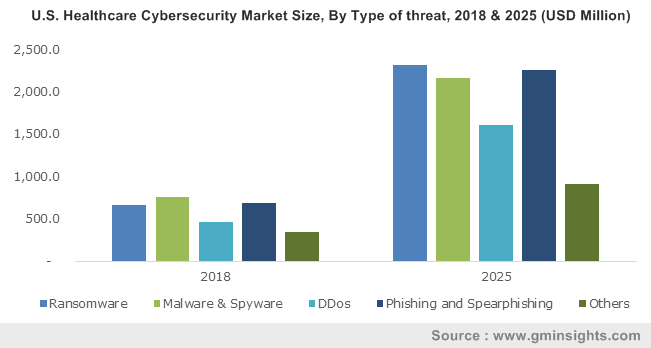How have the prominent efforts by online security solution providers helped stimulate healthcare cybersecurity market share?
Publisher : Fractovia | Published Date : 2019-06-11Request Sample
The rising numbers of cyberthreats in healthcare industry are likely to impact healthcare cybersecurity market share across the globe. An upsurge in population and healthcare issues have substantially proliferated the number of patient medical records stored with the healthcare institutions. Healthcare organizations are specifically vulnerable and targeted by cybercriminals because they possess substantial information of intelligence and high monetary value to cyber thieves and nation-state actors.
U.S. Healthcare Cybersecurity Market Size, By Type of threat, 2018 & 2025 (USD Million)

The targeted data, for most parts, includes financial information like credit card and bank account numbers, patients’ protected health information (PHI), personally identifying information (PII) such as Social Security numbers, and intellectual property related to medical research and innovation. The safeguarding of patient’s information is essentially the responsibility of healthcare organizations and cyberthreats. This growing awareness among organizations will thus help proliferate the healthcare cybersecurity market share.
Why are medical companies more stringent regarding the installation of cybersecurity solutions?
While the global cybersecurity market has a rich end-use clientele, the healthcare sector in particular, has been observed to be rather proactive. The push in cognizance among healthcare companies to protect medical records can be credited to the fact that hackers find health records particularly more attractive.
According to Forbes, the credit card number or social security number of a person may fetch $10 and $2 respectively on the black market, while an electronic health record (EHR) may draw up to $1,000. This black income has led around 18 percent of hospital staffs to breach the policies and steal medical data. In the year 2018, there has been a staggering 298.4% growth in the reported number of patient records breached due to insider-wrongdoing.
The total disclosed number of breached patient records have escalated from 1.1 million in Q1 2018 to 4.4 million in Q3 2018 alone, out of which 680,000 records were breached by insiders. In the face of such a grim scenario, it does not come as a surprise that medical companies are striving to join forces with online security solution providers in order to install the best security service there is. These moves have quite overtly, pushed the graph of healthcare cybersecurity market upwards.
The efforts of Centrify toward product innovation:
Understanding the concern of healthcare industry about medical data breaches, leading cybersecurity solution provider Centrify has developed a defense model based on the standards to maintain strict controls over access and not trusting anyone by default, even inside the network perimeter.
The company has named the security model as Zero Trust Privilege which helps over half of the Fortune 100 companies to eliminate privileged access abuse and prevent data breaches. These technological involvements by the cybersecurity companies in favor of healthcare industry will help expedite healthcare cybersecurity market.
The significance of ClearDATA joining HSCC:
In addition to Centrify, speaking about another instance depicting the collaboration of cybersecurity companies with healthcare institutions to prevent cyber threats, the information security solution provider ClearDATA and the Healthcare and Public Health Sector Coordinating Council Cybersecurity Working Group have recently partnered to establish frameworks and best practices to reduce cyber threat risks across the healthcare industry.
Under this collaboration, the company will work within HPH SCC to propel the national confidence in the healthcare system by improving policy and technology frameworks which mitigate cybersecurity threats. The collaborations like this will contribute to enhancing the landscape of healthcare cybersecurity market.
The strategic moves by the companies and government organizations to prevent cyberthreats have increased in medical industry due to the data vulnerability. In April 2019, 46 healthcare data breaches were registered, an increase of 48% from March and 67% higher than the average number of breaches in a month over the past 6 years.
Though breach numbers have increased, there is a notable reduction in number of compromised healthcare records. In April 2019, 694,710 healthcare records were breached, which is 23.9% reduction from March. It takes around 402 days to discover that healthcare provider is breached which is enough to sell breached data in market and impact revenue and rapport of healthcare industry.
Amid such a scenario, the adoption of new security models, collaborations for advancements, government campaigns are bound to reduce medical cyberattacks and protect patient data. The implementation of these strategies by industry players and governments will positively drive the growth statistics of healthcare cybersecurity market.